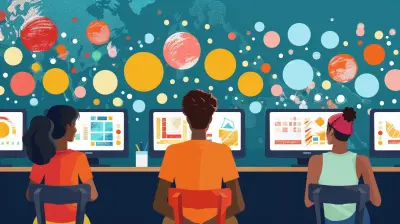The Power of Curiosity: How Inquiry-Based Learning Transforms Education"
8 February 2025
Curiosity is the spark that ignites the fire of learning. From the moment we’re born, our minds are hungry for knowledge, constantly asking questions and exploring the world around us. Yet, as we grow older, traditional education systems often place more emphasis on memorization and standardized testing than on nurturing this natural sense of wonder. Enter inquiry-based learning—an approach that flips the script and puts curiosity at the center of the educational experience.
But what exactly is inquiry-based learning, and why is it so transformative? Let’s dig deep into it.

What Is Inquiry-Based Learning?
Inquiry-based learning is an educational strategy where students take the lead in their learning journey. In a traditional classroom, the teacher often serves as the primary source of knowledge, delivering information while students passively absorb it. In contrast, inquiry-based learning flips this dynamic. The teacher becomes more of a facilitator, guiding students as they ask questions, conduct research, and find answers on their own.Think of it as a scientific method for learning. Students pose questions (inquiries), gather information, test hypotheses, and draw conclusions. It’s a hands-on, brains-on learning process that encourages critical thinking, creativity, and collaboration.
The Four Phases of Inquiry-Based Learning
1. Questioning – It all begins with curiosity. Students start by asking questions based on a topic or problem they're interested in.2. Investigating – This is the research phase, where students use various resources, from books to online platforms, to gather information.
3. Creating – With information in hand, students create solutions or present their findings through projects, presentations, or essays.
4. Reflecting – Finally, students review what they’ve learned and how they arrived at their conclusions, often leading to more questions and further inquiry.
This cycle can repeat endlessly, feeding into students' natural curiosity and creating a never-ending loop of learning.

Why Curiosity Matters in Education
Curiosity is the driving force behind learning. Let’s face it—when we're intrigued by something, we naturally want to know more about it. That’s why inquiry-based learning is so powerful. Rather than forcing students to learn what’s in a textbook, it encourages them to explore topics that genuinely interest them.Curiosity Fuels Engagement
Ever tried to memorize facts for a test, only to forget them the next day? That’s because passive learning doesn't stick. When students are curious, they’re emotionally invested in the material. They’re not just learning for a test—they’re learning because they want to. And when students are engaged, retention of knowledge skyrockets.Think of curiosity like a GPS for education. It directs students toward the subjects they’re passionate about and helps them navigate the complexities of the world around them.
It Encourages Lifelong Learning
The world is constantly evolving, and the jobs of tomorrow may not even exist today. In such an environment, the ability to learn, unlearn, and relearn is crucial. Inquiry-based learning fosters a mindset of continuous discovery. It teaches students that learning doesn’t stop when you leave the classroom—it’s a lifelong endeavor.By focusing on problem-solving and critical thinking, inquiry-based learning equips students with the skills they need to tackle future challenges. They stop seeing failure as a dead end and instead view it as an opportunity to ask new questions and pivot their approach.
Curiosity Cultivates Creativity
Traditional education can sometimes put creativity in a box, limiting students to a narrow set of pre-determined answers. Inquiry-based learning does the opposite. It encourages students to think outside the box, to ask questions that don’t have easy answers, and to explore multiple solutions to a single problem.Take the example of a class project on climate change. Rather than simply memorizing facts about rising temperatures, students could be tasked with researching local solutions to reduce carbon footprints. They might come up with their own creative ideas, like installing solar panels on school roofs or starting a community garden.
In this way, inquiry-based learning not only teaches students what to think but also how to think.

How Inquiry-Based Learning Transforms Education
So, how does curiosity-driven learning change the classroom? Let’s break it down.1. Student-Centered Learning
In traditional education, the teacher is often the "sage on the stage," delivering information while students take notes. Inquiry-based learning, however, turns this model on its head. It’s all about student-centered learning, where the students are at the helm of their own education.Instead of following a rigid curriculum, students explore topics that interest them, leading to a more personalized and meaningful learning experience. Sure, the teacher is still there to guide them, but the students are the ones driving the car.
2. Improves Critical Thinking Skills
One of the most significant benefits of inquiry-based learning is how it strengthens critical thinking. Students aren’t just memorizing facts—they’re analyzing problems, evaluating solutions, and making informed decisions. These are essential skills in nearly every field, from science and technology to business and the arts.In a world where fake news and misinformation abound, the ability to think critically is more important than ever. Inquiry-based learning teaches students to question everything, to be skeptical of easy answers, and to dig deeper for the truth.
3. Promotes Collaboration
Inquiry-based learning often involves group work, where students collaborate to solve complex problems. This teaches them how to work as a team, delegate tasks, and communicate effectively—skills they’ll need throughout their lives, both in and out of the workplace.Imagine a classroom where students are divided into teams to solve a local community issue. Maybe they’re tasked with designing a new recycling system for the school. Each student brings their unique talents and perspectives to the table, learning how to tackle problems from different angles.
4. Builds Confidence and Independence
When students take ownership of their learning, they build confidence in their abilities. They learn to trust their instincts and become more independent thinkers. They stop relying on the teacher to give them all the answers and start seeking solutions on their own.This sense of independence is empowering. It helps students develop a growth mindset, where they believe they can improve and succeed through hard work and perseverance.
5. Encourages Real-World Application
One of the most exciting aspects of inquiry-based learning is how it connects the classroom to the real world. Instead of learning abstract concepts that may seem irrelevant to their lives, students tackle real-world problems that matter to them and their communities. This makes learning more meaningful and applicable.For instance, instead of just reading about environmental science, students could investigate pollution in their local river and come up with ways to address it. This hands-on approach not only makes learning more engaging but also shows students how their education can have a tangible impact on the world around them.

Overcoming Challenges in Inquiry-Based Learning
While inquiry-based learning has many benefits, it’s not without its challenges. For instance, some educators worry that it might be difficult to cover all the required material when students are leading the way. Others might be concerned about managing a classroom where each student is working on a different project.However, these challenges can be overcome with careful planning and flexibility. Teachers can still guide the learning process by setting clear goals and aligning projects with curriculum standards. And while it may take some time to adjust to this new way of teaching, the long-term benefits far outweigh the initial hurdles.
How Educators Can Foster Curiosity in the Classroom
To successfully implement inquiry-based learning, teachers need to foster a culture of curiosity in the classroom. Here are a few ways to do that:1. Ask Open-Ended Questions – Instead of asking questions that have a single correct answer, challenge students with open-ended questions that encourage them to think critically and explore multiple solutions.
2. Create a Safe Space for Failure – Students won’t be afraid to ask questions or take risks if they know failure is part of the process. Encourage growth by framing mistakes as learning opportunities.
3. Incorporate Real-World Problems – Connect classroom lessons to real-world issues to make learning more engaging and relevant.
4. Encourage Peer Collaboration – Foster a collaborative environment where students can brainstorm and problem-solve together.
Conclusion
The power of curiosity is undeniable, and inquiry-based learning is a transformative approach that harnesses this power to create a more dynamic, engaging, and meaningful educational experience. By encouraging students to ask questions, explore multiple solutions, and apply their knowledge in real-world contexts, inquiry-based learning fosters critical thinking, creativity, and a love of learning that lasts well beyond the classroom.So next time you think about education, ask yourself: are we feeding students information, or are we feeding their curiosity?
all images in this post were generated using AI tools
Category:
Inquiry Based LearningAuthor:

Olivia Lewis
Discussion
rate this article
18 comments
Susan McClary
This article beautifully highlights the transformative impact of curiosity in education. Embracing inquiry-based learning nurtures a love for exploration and critical thinking in students, fostering a lifelong passion for learning. Thank you for sharing these insightful perspectives on such an essential topic!
April 6, 2025 at 2:34 AM

Olivia Lewis
Thank you for your thoughtful comment! I'm glad you found the insights on curiosity and inquiry-based learning resonant. It truly can transform education!
London Butler
This article beautifully captures how curiosity ignites passion for learning. Inquiry-based approaches not only foster critical thinking but also inspire lifelong learners. Thank you!
March 1, 2025 at 9:13 PM

Olivia Lewis
Thank you for your kind words! I'm glad to hear the article resonated with you. Curious minds truly drive the passion for learning!
Siena McCaw
Curiosity: the only superpower you need in education! Forget capes; armed with questions, our students will fly through knowledge as they hunt down answers like curious superheroes! 🦸♂️📚✨
February 22, 2025 at 3:34 AM

Olivia Lewis
Absolutely! Curiosity fuels inquiry, driving students to explore, discover, and learn deeply. It's the greatest catalyst for educational transformation! 🌟
Elin McNair
Curiosity is the magical key that unlocks learning! 🗝️ Inquiry-based learning makes education feel like an exciting treasure hunt, turning questions into adventures. Let's embrace our inner explorers! 🌍✨
February 21, 2025 at 9:01 PM

Olivia Lewis
Absolutely! Curiosity fuels inquiry-based learning, making education a thrilling journey of discovery. Let's continue to inspire exploration and ignite a love for learning! 🌟
Drift Riggs
Thank you for this insightful article on the role of curiosity in education. Inquiry-based learning not only fosters critical thinking but also empowers students to take ownership of their learning journey. It's inspiring to see how nurturing curiosity can lead to a deeper understanding and engagement in the classroom.
February 21, 2025 at 1:09 PM

Olivia Lewis
Thank you for your thoughtful comment! I'm glad you found the article insightful and agree on the importance of curiosity in fostering engagement and ownership in learning.
Uri Hines
Curiosity: the spark that ignites learning adventures!
February 21, 2025 at 6:02 AM

Olivia Lewis
Absolutely! Curiosity is indeed the driving force behind inquiry-based learning, fueling exploration and deepening understanding.
Damian McFarland
This article beautifully highlights how curiosity fuels learning. Inquiry-based approaches truly empower students, fostering deeper understanding and engagement in their education.
February 20, 2025 at 12:29 PM

Olivia Lewis
Thank you for your thoughtful comment! I'm glad you resonated with the article's emphasis on curiosity and inquiry-based learning. It truly makes a significant difference in education!
Pierce Chapman
Great insights on fostering curiosity in education!
February 19, 2025 at 8:40 PM

Olivia Lewis
Thank you! I'm glad you found the insights valuable. Curiosity truly is a powerful catalyst for learning!
Betsy Alexander
This article compellingly highlights how inquiry-based learning fosters deeper understanding and critical thinking. However, it could further explore potential challenges teachers face in implementing such methods across diverse educational settings.
February 19, 2025 at 11:32 AM

Olivia Lewis
Thank you for your insightful comment! I appreciate your suggestion and will consider addressing the challenges teachers face in implementing inquiry-based learning in diverse settings in future discussions.
Giovanna Clayton
Curiosity fuels learning! Inquiry-based approaches truly spark engagement and deepen understanding in education.
February 19, 2025 at 4:00 AM

Olivia Lewis
Thank you for your insightful comment! I completely agree—curiosity is essential for fostering deeper understanding and engagement in education.
Thalyn Warren
Inquiry-based learning fosters critical thinking and engagement, empowering students to explore and discover independently.
February 16, 2025 at 9:54 PM

Olivia Lewis
Thank you for highlighting the importance of inquiry-based learning! It truly empowers students to take charge of their learning journey, fostering critical thinking and deeper engagement.
Rayna Murphy
Curiosity-driven inquiry not only engages students but fosters critical thinking and problem-solving skills. This transformative approach cultivates a deeper understanding, empowering learners to become active participants in their education.
February 15, 2025 at 1:43 PM

Olivia Lewis
Thank you for your insightful comment! I completely agree that curiosity-driven inquiry not only enhances engagement but also builds essential skills that empower learners in their educational journeys.
Mistral Carey
Curiosity didn't just kill the cat; it graduated it! Inquiry-based learning transforms classrooms into adventure zones where questions are the new currency, and every “why?” opens a door to knowledge. Let the learning escapades begin!
February 14, 2025 at 8:31 PM

Olivia Lewis
Absolutely! Curiosity fuels exploration, turning classrooms into vibrant spaces for discovery. Embracing inquiry-based learning empowers students to unlock their potential and fosters a lifelong love for learning. Let's embrace the adventure!
Sydney Jenkins
Curiosity fuels innovation and deep understanding. Inquiry-based learning not only engages students but also empowers them to explore and discover.
February 13, 2025 at 3:34 AM

Olivia Lewis
Thank you for your insightful comment! I completely agree—curiosity is the driving force behind meaningful learning and innovation. Inquiry-based learning truly empowers students to take charge of their educational journeys.
Daphne Mason
Curiosity ignites passion, deepens understanding, and empowers students to drive their own learning.
February 12, 2025 at 1:04 PM

Olivia Lewis
Thank you! Curiosity truly is the catalyst for meaningful learning and empowerment in the classroom.
Nancy Brown
This article beautifully encapsulates the transformative potential of inquiry-based learning. Curiosity drives engagement and deep understanding, fostering a dynamic educational environment. Thank you for highlighting such an essential aspect of effective teaching and learning!
February 9, 2025 at 3:28 AM

Olivia Lewis
Thank you for your kind words! I'm glad the article resonated with you and emphasized the importance of curiosity in education.
Axel Bryant
Curiosity ignites passion for learning, fostering critical thinking and deeper understanding in students.
February 8, 2025 at 8:16 PM

Olivia Lewis
Absolutely! Curiosity is the catalyst that drives inquiry-based learning, empowering students to explore, question, and ultimately gain a richer understanding of the world around them.
Ulrich Hill
This article beautifully highlights the vital role curiosity plays in education. Inquiry-based learning not only fosters critical thinking but also engages students in meaningful exploration, making learning more personal and impactful. A transformative approach indeed!
February 8, 2025 at 12:54 PM

Olivia Lewis
Thank you for your insightful comment! I'm glad you found the article highlights the transformative power of curiosity in education.
MORE POSTS

Tech-Savvy Tips for Managing a Paperless Classroom"

The Importance of Sketchbooks in Developing an Artist's Voice

How to Break Down Your Study Materials for Maximum Retention

Engaging Students Through Personalized Learning Approaches

The Role of AI Tutors in Supporting Personalized Instruction

The Benefits of Experiential Learning in Increasing Engagement

How to Handle Study Burnout and Recharge Effectively

How to Help Children Develop a Strong Sense of Identity

Promoting Positive Self-Talk and Self-Reflection in Students

Exploring Abstract vs. Realism: Helping Students Find Their Style

How Online Simulations are Enhancing Learning in Science and Math